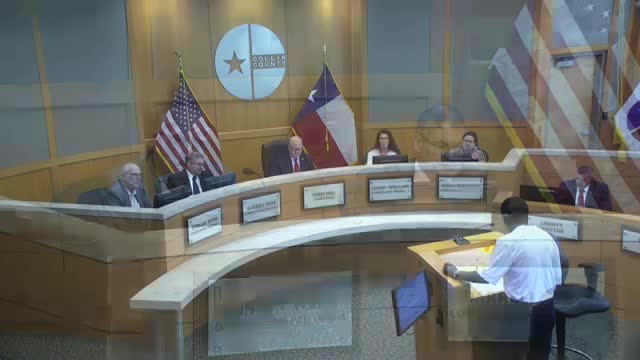Volunteers Urge Increased Staffing to Support Inmate Programs at Local Jail
August 04, 2025 | Collin County, Texas
This article was created by AI summarizing key points discussed. AI makes mistakes, so for full details and context, please refer to the video of the full meeting. Please report any errors so we can fix them. Report an error »

In a recent budget workshop held on August 4, 2025, in Collin County, Texas, discussions highlighted significant challenges facing the local jail's programs department, particularly regarding staffing shortages that impact inmate rehabilitation efforts. The meeting featured testimonies from community volunteers, including Jana Ashburn, who emphasized the critical need for adequate security personnel to facilitate educational programs for inmates.
Ashburn, who teaches anger management and other classes, described the logistical difficulties caused by a lack of available guards to escort inmates to and from classes. She noted that many inmates, particularly those classified as violent offenders, require special supervision, which has led to frequent cancellations of scheduled programs. This situation not only disrupts the educational opportunities for inmates but also frustrates volunteers who dedicate their time to support rehabilitation efforts.
The testimony underscored a broader issue within the jail system, where the growing number of volunteers and programs is not matched by sufficient staffing resources. Ashburn urged county officials to consider increasing funding for the programs department to ensure that the right personnel are available to support these initiatives consistently. She pointed out that the current staffing challenges have led to a decline in morale among both inmates and volunteers, as repeated cancellations can diminish trust in the program's reliability.
The discussions also touched on whether these staffing issues have worsened over time. While Ashburn indicated that such cancellations have occurred sporadically in the past, she acknowledged a recent uptick in frequency, correlating with the expansion of the programs department and the influx of new volunteers eager to contribute.
As the county prepares its budget for the upcoming fiscal year, the insights shared during this workshop highlight the urgent need for strategic investment in staffing to enhance the effectiveness of rehabilitation programs. Addressing these challenges could lead to improved outcomes for inmates and a more robust support system for volunteers committed to fostering positive change within the community. The next steps will likely involve further discussions on budget allocations to ensure that the necessary resources are in place to support these vital programs.
Ashburn, who teaches anger management and other classes, described the logistical difficulties caused by a lack of available guards to escort inmates to and from classes. She noted that many inmates, particularly those classified as violent offenders, require special supervision, which has led to frequent cancellations of scheduled programs. This situation not only disrupts the educational opportunities for inmates but also frustrates volunteers who dedicate their time to support rehabilitation efforts.
The testimony underscored a broader issue within the jail system, where the growing number of volunteers and programs is not matched by sufficient staffing resources. Ashburn urged county officials to consider increasing funding for the programs department to ensure that the right personnel are available to support these initiatives consistently. She pointed out that the current staffing challenges have led to a decline in morale among both inmates and volunteers, as repeated cancellations can diminish trust in the program's reliability.
The discussions also touched on whether these staffing issues have worsened over time. While Ashburn indicated that such cancellations have occurred sporadically in the past, she acknowledged a recent uptick in frequency, correlating with the expansion of the programs department and the influx of new volunteers eager to contribute.
As the county prepares its budget for the upcoming fiscal year, the insights shared during this workshop highlight the urgent need for strategic investment in staffing to enhance the effectiveness of rehabilitation programs. Addressing these challenges could lead to improved outcomes for inmates and a more robust support system for volunteers committed to fostering positive change within the community. The next steps will likely involve further discussions on budget allocations to ensure that the necessary resources are in place to support these vital programs.
View full meeting
This article is based on a recent meeting—watch the full video and explore the complete transcript for deeper insights into the discussion.
View full meeting
